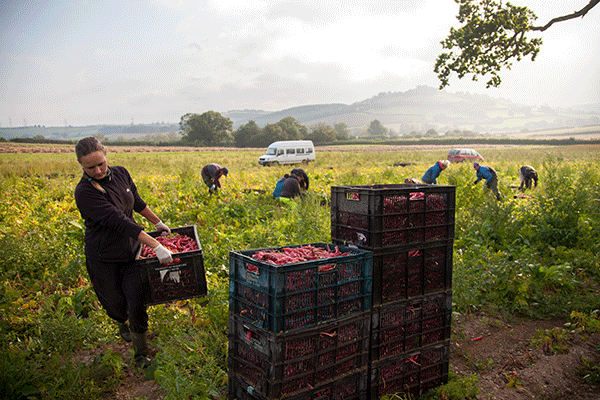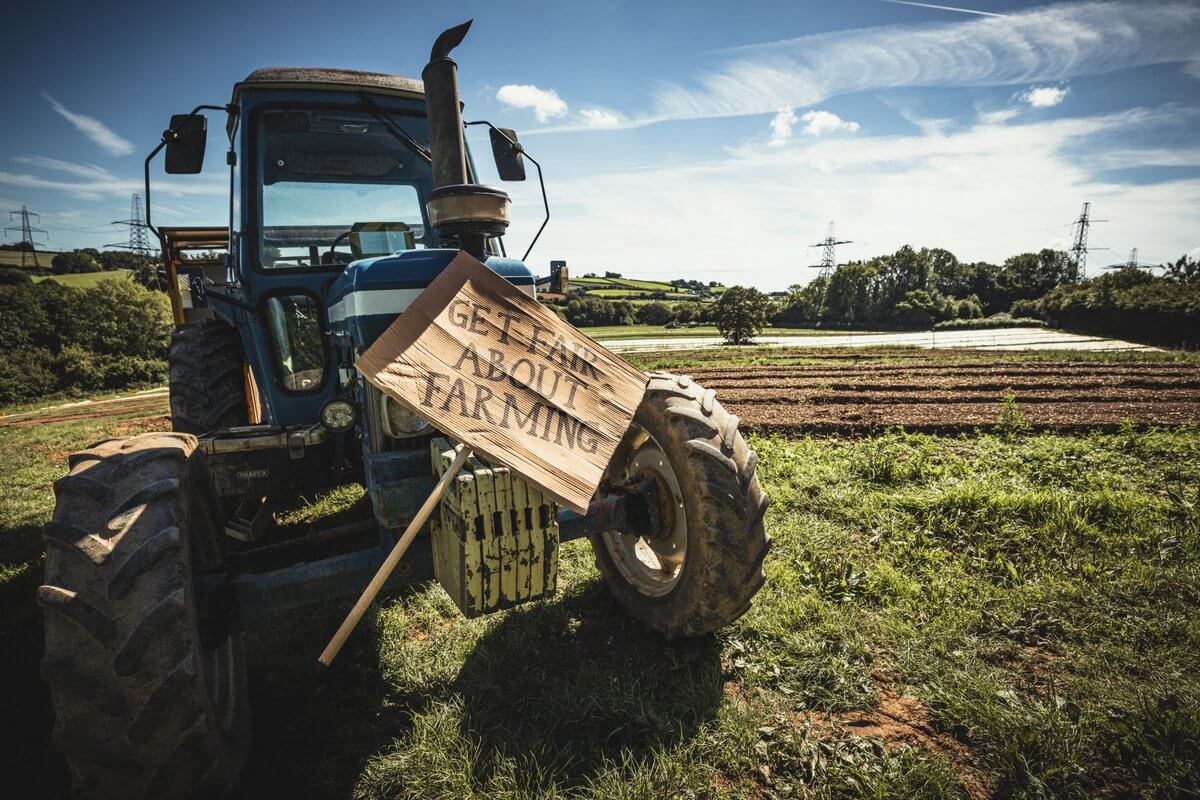Demand for local food and a supercharged interest in gardening has combined with Brexit bureaucracy to create delays and a growing shortage of heritage and organic seed.
The shortage has further long-term potential to reduce the amount of plant biodiversity growing in the UK, thanks to renationalising a previously pan-European seed list without transferring all existing certified seeds.
The move, which according to seed suppliers has left off many heritage variety ‘staples’, means British small organic and heritage growers will have fewer seeds available officially, reducing the potential for locally-adapted and climate resilient varieties.
Heritage seed suppliers including Vital Seeds in Devon, The Seed Co-operative in Lincolnshire and Real Seeds in Wales all have daily caps on their websites, as they deal with a backlog and delays in orders from Europe due to new certifications and paperwork.
“Last year we had people put an order in January, and then order again in March because their veg box scheme had suddenly doubled in size. The demand for local food has gone through the roof, people want to know where their food is from,” said David Price, managing director of Lincolnshire-based The Seed Co-operative.
“Since lockdown, it has been absolutely crazy. Sales were up 600 per cent by last autumn on the year before,” he said. “Covid has definitely heightened people’s awareness of food issues, availability and provenance. Panic buying really hit home with a lot of people; it acted on this latent sense that people needed to do more to build their resilience.”

Fred Groom, founder of Vital Seeds, said everyone is “overwhelmed by orders”. “It’s a similar scenario in the conventional seed market. And we’ve seen US seed suppliers shut down as well,” he said.
“Brexit plus Covid has increased people’s worry, and the major panic was last March when over one weekend orders went crazy.”
Vital Seeds has seen orders quadruple in the last year and has expanded its outdoor growing space to coincide. But orders placed last summer with European suppliers are yet to arrive and Groom said “there are definitely shortages”.
Delays are being caused by a similarly huge interest in food growing across Europe, where demand for seed is just as high, coupled with a poor growing season in central Europe last year and teething issues around Brexit paperwork.

“The Brexit paperwork has been a complete nightmare,” said Price. “It comes back to being a small team; we don’t have someone sitting in an office dealing with Brexit. 20 per cent of our sales were going to the EU, predominantly to Ireland, but we’ve stopped all exports including to Northern Ireland. It was too complicated so we shut it down.
“You couldn’t prepare for it because there was no one to tell you definitively what to prepare for.”
The British seed sector imports around 80 per cent of its seed from overseas. The link with biodiversity and small-scale growers comes from the type of seed they use: ‘open pollinated’ refers to seed that is not commercially owned and can be saved for re-use. As a result, it is much more genetically diverse and likely to have adapted to unique local conditions, boosting both yields and climate resilience.
“Open-pollinated seed is designed and bred for organic systems and organic systems are designed for diversity,” said Price. “Diversity keeps the planet going; without it we are stuffed.”
The Seed Co-operative has sold out of organic broad bean seed, Price said, while Vital Seeds has sold out of their homegrown British tomato seed and won’t be restocking. Other staples such as the popular Black Beauty aubergine have not been added to the UK National Seed List, which could limit availability in the future.

Vital Seeds’s Ronja Schlumberger said: “The UK National Seed and Plant List really limits the availability, especially of rare or older varieties. The box schemes will suffer the most.
“We are seeing delays but it will be more about the limits on certain varieties. For instance, we can’t get Borlotti beans at the moment, which are such a lovely crop,” she said.
All EU countries have their own national seed list, which is also amalgamated into a common EU seed catalogue. “It was transferred in a mad rush to the UK national list, and there are a whole load of varieties that aren’t on the list. They didn’t think small seed suppliers would be that bothered and didn’t make a point of telling us,” said Price. “Tens if not hundreds of varieties could be lost.”
Amateur gardeners can save their own seed to preserve their own supply, but to help stem the wider shortage in open-pollinated seeds, professional growers are needed.
“It comes down to experienced growers who are able to branch out into seeds,” added Price. “Amateur growers won’t have the skills to do it at scale in a commercial way. If that doesn’t come through then yes, there is potentially going to be a bottleneck.”
“Things could change quite quickly if these growers come through. From one pack of carrots you can produce an awful lot of carrot seed.”













Amateur gardeners can save their seed for use in the UK, but are now not allowed to take it across the Channel. We have been saving seed and growing saplings for the last few years, to plant on our permaculture forest farm in France. Our plans were delayed last year due to Covid, but we managed to get some saplings planted. Now suddenly we can’t take saplings, plants, fruits, nuts, roots, cuttings or seeds for our own use without certification, which is not available to us.
Wow that is so annoying! What is the certification process like?
Where is your forest farm in France?
‘To apply for a phytosanitary certificate, start by contacting your relevant plant health authority in England, Wales, Scotland or Northern Ireland. You’ll be asked to register with the Government’s plant health IT service edomero. The fee is £25.52 per certificate. But an inspector may have to visit you, costing £63.80 for each 15 minutes and subject to a minimum fee of £127.60. It’s also possible that laboratory tests will need to be done, costing £33.56.’
So this is not possible for us. Our seeds are collected from plants we have grown or bought from supermarkets or been given by friends. We are not growing commercially.
The farm is in Nouvelle Aquitaine, Western France. You can see our instagram if you’re curious @permacultureplus
That is some hefty bureaucracy, I presume that these are a result of Brexit?
I had a similar experience with bureaucracy in France, I needed to have my MOT while I was living there on my UK car, but to do this they wanted to inspect the car in a lab to see it was up to scratch. It seemed especially over the top considering the car was made by French manufacturer Renault!
Looks idyllic indeed! Does Brexit change things for you with owning property in France at all?
I’m no expert on this but isn’t there anything we can do about the missing veg on the government list like petition them to review it with an expert from a seed company to make sure that all varieties are added?
@ Donna
I was just thinking the same thing but it needs more than a petition. I am not an expert also, but I do know some about the geopolitics of deregulation https://corporateeurope.org/en/food-and-agriculture/2018/05/embracingnature. Important to respond to DEFRA’s gene editing consultation (if in agreement with GM Freeze etc) https://www.gmwatch.org/en/news/latest-news/19672-how-to-respond-to-the-uk-consultation-on-the-deregulation-of-gene-editing. Also important to discuss false climate change solutions.
I will be writing to my Conservative MP. I hope to raise the matter with the CEE Bill Alliance. It needs more than a petition and perhaps key MPs and Lords can be contacted.
Not all my thoughts are in line with those of the Green Alliance, but I will try and ponder over some of these briefings…..https://greeneruk.org/briefings/environment-bill. I think multi-pronged strategies are needed. Smaller NGOs and individuals must speak out as larger NGOs can, on occasion, take compromising positions or “don’t wear enough hats” dealing just with the wood and not the trees perhaps? Fingers crossed that heads are taken out of the sand and actions taken.
We can choose not to roll over.
Useful podcast on the history of seed legislation by The Kitchen Garden Magazine.
https://play.acast.com/s/kitchengardenmagazine/046thefutureofseeds-post-brexit-
Thank you. There is also the Gene Editing deregulation situation to take into account. Please see my reply to Donna. There are DEFRA unknowns regarding deregulation but we do know the agenda i.e. deregulation. Important issues.
I am nearly at the end of the podcast and no mention of GM (?) or did I miss something, which is worrying and surprising when GM Freeze was making a bit effort to warn everyone. Some choose to pass by and look the other way. Others were not aware.
https://www.gmfreeze.org/brexit/
GM Freeze is campaigning to protect UK farmers right to farm responsibly, fairly and sustainably and consumers’ right to make informed choices.
This means ensuring that the UK has:
Rigorous GM regulation that protects people, animals and the environment.
GM labelling that allows people to take control of what they are eating.
Protection from GM contamination.
Hopefully something can be done but action needs to be fast and strong.
I joined the Garden Organic Heritage Seed Library many years ago. I help to organise our local seed swap , which was difficult this year because of government restrictions, but we still managed to give away all of the seed that HSL sent us to distribute and collected £60 in donations which will help them to keep this amazing resource live.
Local gardeners or allotmenters can become ‘Seed Guardians” and help to protect local varieties.
Also look at the work Vandana Shiva has been doing over the decades – Navdanya International –
her interview with Robert Kennedy Jnr is well worth a watch to get an idea of the bigger picture and how important seed protection is.
https://childrenshealthdefense.org/defender/rfk-jr-interviews-vandana-shiva-gates-empire/?utm_source=salsa&eType=EmailBlastContent&eId=230c8846-4715-42be-918d-099d8ea5b552
I’m trying to find info on Who Supplies Our Seeds to create a Seed Map showing where different seeds are grown and from where they’re imported. It seems hard to trace seed supply from source, (there certainly don’t seem to be reliable figures from govt departments) and I’m particularly interested how so much seed is now being grown outside Europe where labour is cheaper etc etc. If anyone can give me some leads I would be super grateful thank you.